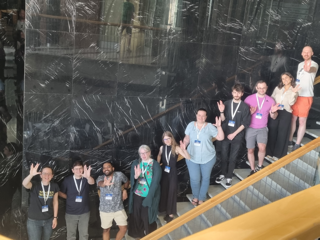| Author(s) |
|
Posted on: 18 December 2024 purlPURL: https://gxy.io/GTN:N00100
🚀 2024: A SPOC-tacular Year in Review 🌌
As we orbit the end of another stellar year, let’s engage warp drive and reflect on the out-of-this-world achievements of the Single-cell & sPatial Omics Community (SPOC 🖖). From launching new tools to charting new tutorials, SPOC’s journey through the Galaxy (platform) has been nothing short of cosmic! 🌠
🌟 The Mission: Empowering Single-Cell Scientists
This year, we continued to boldly go where no omics community has gone before, propelling the SPOC ecosystem beyond single-cell RNA sequencing. With new training materials, tools, and workflows, our community has bridged the gap between transcriptomics, multiomics, and even spatial data analysis, ensuring that researchers have the tools they need to explore biological frontiers. Think of it as assembling the ultimate research starship! 🚀
🌌 SPOC: A Nebula of Collaboration
Our Write-a-thons this year were true cosmic collisions of brilliance, bringing together contributors to polish workflows and draft tutorials. We also unified SPOC’s subdomains into one hyper-efficient portal with our friends from Australia. The community’s fusion power—collaboration—continues to drive SPOC’s development at lightspeed, with the launch of our first SPOC Collaboration Fest that brought Galaxy and non-Galaxy single-cell scientists together to sustain our ever-expanding galaxy of omics science. The GTN mission control kept engineering stellar widgets for the SPOC galaxy, unveiling a shiny new constellation layout for our training page and advanced asteroid-sifting tools to navigate the meteoric flow of events and news from our community!
🌠 Tools and Tutorials: A Star Cluster of Resources
In 2024, SPOC added 15 new tools and 6 new training resources to the Galaxy Training Network (GTN)—a constellation that lights the way for researchers navigating the complexities of single-cell and spatial omics. The introduction of SnapATAC2 and Squidpy tools felt like finding life-supporting planets in uncharted galaxies. These additions - and our wider commitment to sustainability and updating materials - ensure our workflows are as sharp as a lightsaber. ✨🛠️
🚀 Research Data Management: Guiding Stars for FAIR Practices
Following the FAIR (Findable, Accessible, Interoperable, Reusable) data principles, SPOC emphasized sustainability by implementing best practices in data archiving and tool maintenance. We co-led a BioHackathon Europe project with our fellow Microbiome commanders aimed at effectively labelling our tools and building the single-cell toolshed category. From tutorials on history-sharing to archiving for training data preservation, we’re keeping our resources as eternal as starlight. 🌟
🌍 SPOC’s Global Universe
With SPOC’s unified platform, global events, rolling timezones, and sustainability prioritisation of user testing across servers, we’ve brought researchers from every corner of the planet into our orbit. Whether you’re beaming in from Europe, the Americas, or the Andromeda Galaxy (or maybe Australia), SPOC’s resources remain accessible, scalable, and universal.
🌌 Looking to the Horizon
As SPOC’s starship accelerates toward 2025, we’ll continue to explore new omics territories and deepen our cosmic connections across the Galaxy. Thank you to every SPOC cadet, captain, and commander who contributed this year—you’ve made SPOC the brightest star in the bioinformatics universe!
Keep reaching for the stars, SPOC-nauts! 🪐✨
 Open image in new tab
Open image in new tab